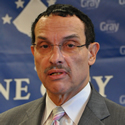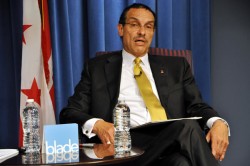Local
Gray board appointee called gays ‘faggots’
Local activists divided over decision to name Leroy Thorpe to post


Mayor Vincent Gray’s decision to appoint a controversial civic leader to a mayoral advisory committee has rankled some. (Blade file photo by Michael Key)
Gay activists had mixed views this week over a decision by Mayor Vincent Gray to appoint a controversial civic leader who in past years referred to gays as “faggots” to a mayoral advisory committee that looks at city programs to curtail juvenile delinquency.
Gray last week named Leroy Thorpe, a licensed social worker and counselor with the D.C. Department of Youth Rehabilitation Services and a longtime civic activist in the city’s Shaw neighborhood, to the mayor’s Juvenile Justice Advisory Group. The unpaid advisory panel assists the mayor and DYRS, among other things, on how to use federal funds to strengthen the city’s juvenile justice system.
D.C. Council member Jack Evans (D-Ward 2), a longtime supporter of LGBT rights, sent Gray a letter strongly recommending Thorpe for the appointment.
Evans could not be immediately reached for comment.
And Ron Collins, Gray’s gay director of the Mayor’s Office of Boards and Commissions, said he vetted Thorpe for the appointment and recommended that the mayor name him to the advisory panel. Collins said Thorpe’s background and experience on juvenile justice issues showed him to be qualified for the post.
“I’ve known Leroy Thorpe for a number of years and I really don’t feel that he is a bigot toward any community,” Collins told the Blade.
Thorpe told the Blade in a phone message on Monday that he prefers not to discuss things he said in the past but said he’s changed his views and treats all people with respect.
“These days, you know, I got older, got wiser,” he said. “And I don’t act like I did before, back in the time when…I spoke without thinking. Everybody deserves respect and I don’t care who or what you are.”
Martin Moulton, president of the Convention Center Community Association, a Shaw-based group that has long been at odds with Thorpe, says Thorpe’s “history of bigotry” makes him unsuitable for a mayoral appointment.
In a series of e-mails sent to public officials and gay activists, Moulton points to statements Thorpe has made about gays on at least two occasions over the past 20 years. One took place in 1991, when Thorpe shouted through a bullhorn at a polling station on Election Day that gay City Council candidate Jim Zais was a “faggot” and Shaw voters should not support him.
Zais, who died of AIDS in 1994, lost the election to Evans by a close margin. At the time, Evans and his supporters disavowed Thorpe’s characterization of Zais, saying he wasn’t representing Evans or the Evans campaign.
Moulton noted that Thorpe several years ago called gay D.C. Council member David Catania (I-At-Large) an anti-gay name during a City Council hearing.
According to Moulton, Gray violated a promise he made to the Gay and Lesbian Activists Alliance on a GLAA questionnaire during last year’s mayoral election campaign, when Gray said he would “decline to honor individuals or organizations that promote any sort of bigotry.”
William Waybourn, former publisher of the Washington Blade and a Shaw resident, said Thorpe called him a faggot during a Shaw Advisory Neighborhood Commission meeting in 2007 after Waybourn spoke at the meeting on an issue unrelated to LGBT rights.
“I don’t know why he did it,” said Waybourn.
Waybourn said Thorpe was less hostile toward him a short time later when the two attended a hearing by the city’s Alcoholic Beverage Control Board. Thorpe testified at the hearing against an application for a liquor license by owners of BeBar, a gay bar seeking to open on 9th Street in the Shaw neighborhood. Thorpe joined members of Shiloh Baptist Church, located across the street from the bar, who opposed the bar on grounds that it was not appropriate for it to be that close to a church.
The ABC Board later approved the license.
Shaw Advisory Neighborhood Commissioner Alex Padro, who has had dealings with Thorpe when Thorpe served on the ANC, called Thorpe’s appointment to a city board an “outrage.”
“The suggestion that someone with his record has changed doesn’t ring true,” he said.
Veteran D.C. gay activist and Ward 8 community leader Phil Pannell and Christopher Dyer, director of the city’s Office of GLBT Affairs under former Mayor Adrian Fenty, each said they have cordial relations with Thorpe and don’t consider him to be anti-gay.
“He might have been a homophobe in the past but I have observed a change,” Dyer said. “I don’t think deep down inside his soul he is homophobic.”
Pannell said Thorpe on several occasions has attended Pannell’s birthday celebration at a Ward 8 restaurant, which Pannell often uses as a fundraiser for community organizations or charitable causes.
“He has always been very respectful to me,” said Pannell. “He came to one of my functions with his wife. I would be hard pressed to call someone a homophobe who comes to my birthday,” said Pannell, who notes that his sexual orientation is widely known in political circles throughout the city.
Pannell said that while Thorpe clearly has used poor judgment in some of his references to gays in the past, he said he was moved when Thorpe showed up at Jim Zais’ memorial service in 1994 and apologized for the Election Day incident in which he called Zais an anti-gay name.
GLAA Vice President Rick Rosendall said he is troubled over Thorpe’s past remarks using the word “faggot” and believes Thorpe’s appointment could represent a contradiction to Gray’s response to the GLAA candidate questionnaire. But Rosendall said he also believes in “redemption” by people who change their views and attitudes on LGBT people.
“If he truly has changed, that’s something we would welcome,” he said.
District of Columbia
D.C. Black Pride theme, performers announced at ‘Speakeasy’
Durand Bernarr to headline 2026 programming

The Center for Black Equity held its 2026 DC Black Pride Theme Reveal event at Union Stage on Monday. The evening, a “Speakeasy Happy Hour,” was hosted by Anthony Oakes and featured performances by Lolita Leopard and Keith Angelo. The Center for Black Equity organizes DC Black Pride.
Kenya Hutton, Center for Black Equity president and CEO, spoke following the performances by Leopard and Angelo. Hutton announced this year’s theme for DC Black Pride: “New Black Renaissance.”
Performers for 2026 DC Black Pride were announced to be Bang Garcon, Be Steadwell, Jay Columbus, Bennu Byrd, Rue Pratt and Akeem Woods.
Singer-songwriter Durand Bernarr was announced as the headliner for the 2026 festivities. Bernerr gave brief remarks through a video played on the screen at the stage.
DC Black Pride is scheduled for May 22-25. For more information on DC Black Pride, visit dcblackpride.org.
Virginia
Arlington LGBTQ bar Freddie’s celebrates 25th anniversary
Owner asks public to support D.C.-area gay bars

An overflowing crowd turned out Sunday night, March 1, for the 25th anniversary celebration of Freddie’s Beach Bar, the LGBTQ bar and restaurant located in the Crystal City section of Arlington, Va.
The celebration began as longtime patrons sitting at tables and at the bar ordered drinks, snacks, and full meals as several of Freddie’s well-known drag queens performed on a decorated stage.
Roland Watkins, an official with Equality NoVa, an LGBTQ advocacy organization based in the Northern Virginia areas of Arlington, Alexandria, and Fairfax County, next told the gathering about the history of Freddie’s Beach Bar and the role he said that owner Freddie Lutz has played in broadening the bar’s role into a community gathering place.
“Twenty-five years ago, opening a gay bar in Arlington was not a given,” Watkins told the crowd from the stage. “It took courage, convincing, and a deep belief that our community belongs openly, visibly, and proudly,” he said. “And that belief came from Freddie.”
Watkins and others familiar with Freddie’s noted that under Lutz’s leadership and support from his staff, Freddie’s provided support and a gathering place for LGBTQ organizations and a place where Virginia elected officials, and candidates running for public office, came to express their support for the LGBTQ community.
“Over the past 25 years, Freddie’s has become more than a bar,” Watkins said. “It has become a community maker.”
Lutz, who spoke next, said he was moved by the outpouring of support from long-time customers. “Thank you all so much for coming tonight and thank you all so much for your support over the past 25 years,” he said. “I can’t tell you how much that means to me and how much it’s kept me going.”
But Lutz then said Freddie’s, like many other D.C. area gay bars, continues to face economic hard times that he said began during the COVID pandemic. He noted that fewer customers are coming to Freddie’s in recent years, with a significant drop in patronage for his once lucrative weekend buffet brunches.
“So, I don’t want to be the daddy downer on my 25-year anniversary,” he said. “But this was actually the worst year we’ve ever had,” he added. “And I guess what I’m asking is please help us out. Not just me, but all the gay bars in the area.” He added, “I’m reaching out and I’m appealing to you not to forget the gay bars.”
Lutz received loud, prolonged applause, with many customers hugging him as he walked off the stage.

In an official statement released at the reveal event Capital Pride Alliance described its just announced 2026 Pride theme of “Exist, Resist, Have the Audacity” as a “bold declaration affirming the presence, resilience, and courage of LGBTQ+ people around the world.”
The statement adds, “Grounded in the undeniable truth that our existence is not up for debate, this year’s theme calls on the community to live loudly and proudly, stand firm against injustice and erasure, and embody the collective strength that has always defined the LGBTQ+ community.”
In a reference to the impact of the hostile political climate, the statement says, “In a time when LGBTQ+ rights and history continue to face challenges, especially in our Nation’s Capital, where policy and public discourse shape the future of our country, together, we must ensure that our voices are visible, heard, and unapologetically centered.”
The statement also quotes Capital Pride Alliance CEO and President Ryan Bos’s message at the Reveal event: “This year’s theme is both a declaration and a demand,” Bos said. “Exist, Resist, Have Audacity! reflects the resilience of our community and our responsibility to protect the progress we’ve made. As we look toward our nation’s 250th anniversary, we affirm that LGBTQ+ people have always been and always will be part of the United States’s history, and we will continue shaping its future with strength and resolve,” he concluded.
-

 India5 days ago
India5 days agoActivists push for better counting of transgender Indians in 2026 Census
-

 Advice4 days ago
Advice4 days agoDry January has isolated me from my friends
-

 District of Columbia4 days ago
District of Columbia4 days agoCapital Pride reveals 2026 theme
-

 National4 days ago
National4 days agoAfter layoffs at Advocate, parent company acquires ‘Them’ from Conde Nast



















